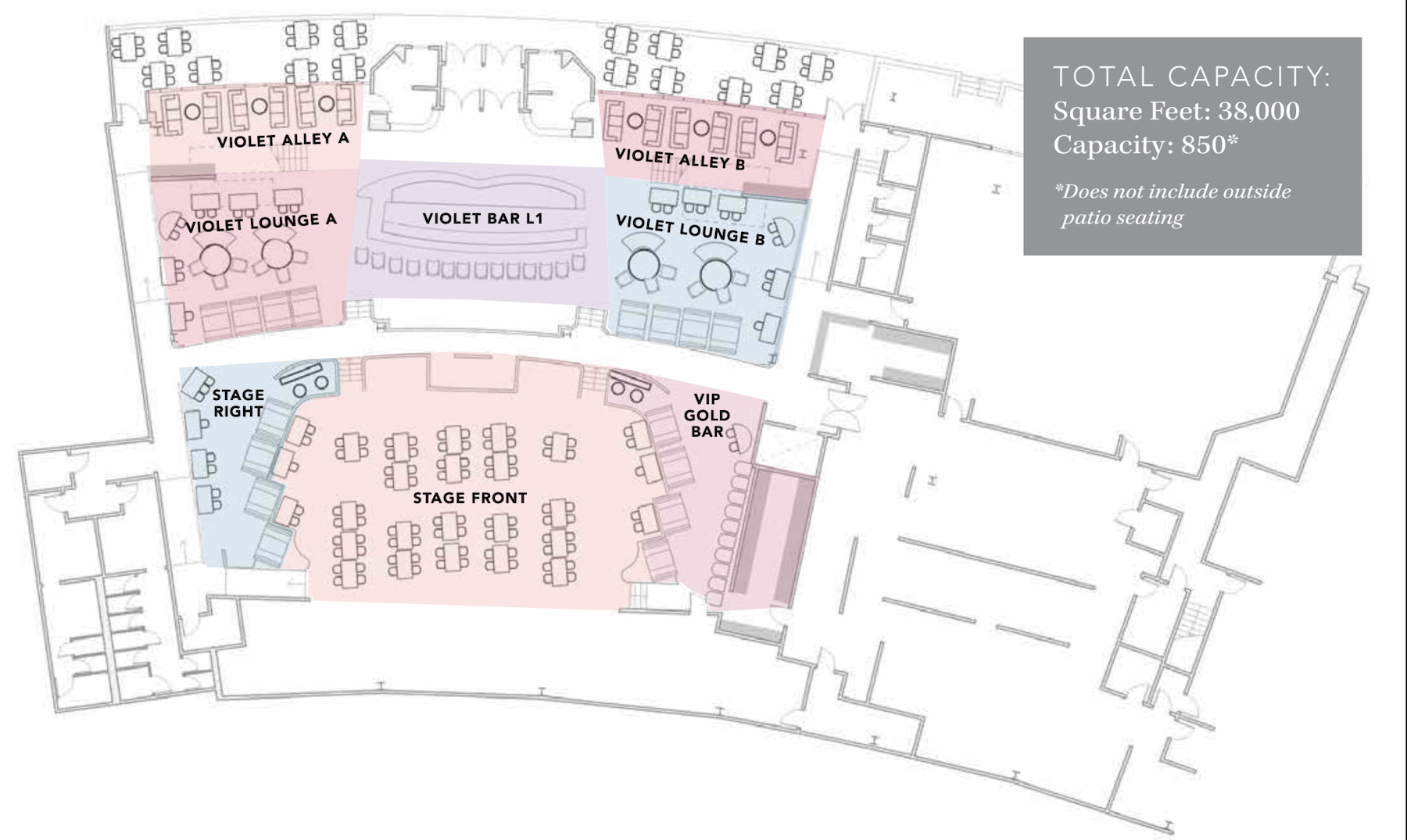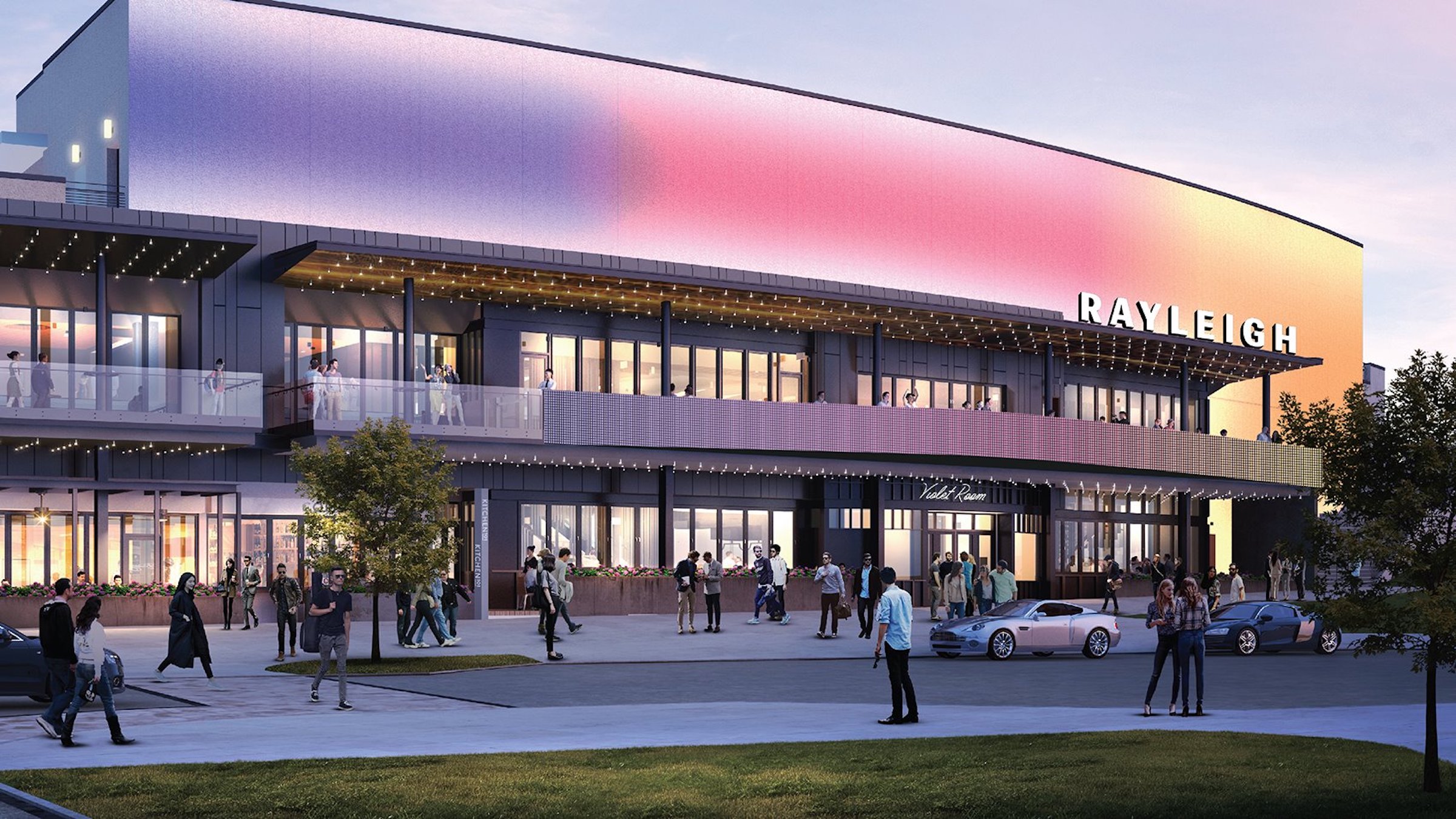Late next month, the Toyota Music Factory, a large entertainment hub in Irving, Texas, with 20 restaurant and entertainment concepts, will have a soft opening for Rayleigh Underground, a 38,000-sf theater with a capacity of 850 and complemented by an overhead 6,000-person concert venue operated by Live Nation.
Named after Lord Rayleigh, a Nobel Prize-winning scientist who first identified acoustics and lightwave scattering, Rayleigh Underground features an 18x50-ft stage with a 36x18-ft Absen 2.9 pitch video wall on the center stage. The venue will also have multiple interactive LED screens throughout, six bars, of which two are VIP; a large ballroom/conferencen space that can accommodate three separate dining areas; and an AV Booth to MC any type of event or performance.
According to Chris Michero, co-founder and design principal with Dallas-based Emblem Interior Design, this project’s interior designer, Rayleigh Underground was created to provide a more intimate space for performers, artists, comedians, and guest speakers, along with a “submissive” Pacific Rim-flavored dining experience for guests.
Venue’s design tells stories
This project has been in the works for several years. The Toyota Music Factory opened in late 2017. A year later, following a resolution of a financial dispute between the city and developer, the Dallas News reported that the hub would add five restaurants and bars, including one called Rayleigh Underground and Violet Room that included a large stage.
Michero explains that Rayleigh Underground’s completion was impeded by several factors.
The project’s original designer “created a lot of issues [with] regard to mechanical, HVAC, space planning, etc.,” he says in an email to BD+C. “There was no real design narrative.” When Emblem was hired to replace that designer, it did a full redesign that touched every finish and material. Emblem created “storied spaces that give the guests a sense of place and a history to the interiors, which makes each experience more memorable.” Michero adds that the size of Rayleigh Underground and the multiple areas within it “tie back to our design narrative.”
Like entering a cave

One of those “narratives” fuses innovative technology with the raw aesthetic of an excavated underground amphitheater. StoneCoat’s limestone plaster cladding creates interior and exterior surfaces that project the look and feel of authentic rock, stone, and stucco.
“We wanted to create a unique and memorable guest experience,” said Kim Forsythe, owner of Restaurant Expert Management, Rayleigh Underground’s client, in a prepared statement.
Other members of Rayleigh Underground’s building team include PGP Construction (GC), Herb Goodman (CM and owner’s rep), Mark Hopper (architect), Brookfield Properties Development (the Toyota Music Factory landlord), GME (electrical), EPS (plumbing), Kosel (HVAC and controls), Hatfield (acoustical drywall assemblies), Carpentry Associates (millwork and metalwork for the bars), AllPro (A/V), Highland (fire suppression), Mitec (fire and property protection), Stonehill Industries (painting), Sigma Signs (signage), and CMC Network Solutions (data and low voltage).
Rayleigh Underground is scheduled to open officially in December.
Related Stories
| Aug 11, 2010
Curtain rises on Broadway's first green theater
The Durst Organization and Bank of America have opened New York's first LEED-certified theater, the 1,055-seat Henry Miller's Theatre. Located inside the new 55-story Bank of America Tower at One Bryant Park, the 50,000-sf theater is located behind the preserved and restored neo-Georgian façade of the original 1918 theater.
| Aug 11, 2010
Restoration gives new life to New Formalism icon
The $30 million upgrade, restoration, and expansion of the Mark Taper Forum in Los Angeles was completed by the team of Rios Clementi Hale Studios (architect), Harley Ellis Devereaux (executive architect/MEP), KPFF (structural engineer), and Taisei Construction (GC). Work on the Welton Becket-designed 1967 complex included an overhaul of the auditorium, lighting, and acoustics.
| Aug 11, 2010
Gold Award: Eisenhower Theater, Washington, D.C.
The Eisenhower Theater in the John F. Kennedy Center for the Performing Arts in Washington, D.C., opened in 1971. By the turn of the century, after three-plus decades of heavy use, the 1,142-seat box-within-a-box playhouse on the Potomac was starting to show its age. Poor lighting and tired, worn finishes created a gloomy atmosphere.
| Aug 11, 2010
Giants 300 University Report
University construction spending is 13% higher than a year ago—mostly for residence halls and infrastructure on public campuses—and is expected to slip less than 5% over the next two years. However, the value of starts dropped about 10% in recent months and will not return to the 2007–08 peak for about two years.
| Aug 11, 2010
Bowing to Tradition
As the home to Harvard's Hasty Pudding Theatricals—the oldest theatrical company in the nation—12 Holyoke Street had its share of opening nights. In April 2002, however, the Faculty of Arts and Sciences decided the 1888 Georgian Revival building no longer met the needs of the company and hired Boston-based architect Leers Weinzapfel Associates to design a more contemporary facility.
| Aug 11, 2010
Team Tames Impossible Site
Rensselaer Polytechnic Institute, the nation's oldest technology university, has long prided itself on its state-of-the-art design and engineering curriculum. Several years ago, to call attention to its equally estimable media and performing arts programs, RPI commissioned British architect Sir Nicholas Grimshaw to design the Curtis R.
| Aug 11, 2010
Silver Award: Hanna Theatre, Cleveland, Ohio
Between February 1921 and November 1922 five theaters opened along a short stretch of Euclid Avenue in downtown Cleveland, all of them presenting silent movies, legitimate theater, and vaudeville. During the Great Depression, several of the theaters in the unofficial “Playhouse Square” converted to movie theaters, but they all fell into a death spiral after World War II.
| Aug 11, 2010
Biograph Theater
Located in Chicago's Lincoln Park neighborhood, Victory Gardens Theater Company has welcomed up-and-coming playwrights for 33 years. In 2004, the company expanded its campus with the purchase of the Biograph Theater for its new main stage. Built in 1914, the theater was one of the city's oldest remaining neighborhood movie houses, and it was part of Chicago's gangster lore: in 1934, John Dillin...
| Aug 11, 2010
Platinum Award: Reviving Oakland's Uptown Showstopper
The story of the Fox Oakland Theater is like that of so many movie palaces of the early 20th century. Built in 1928 based on a Middle Eastern-influenced design by architect Charles Peter Weeks and engineer William Peyton Day, the 3,400-seat cinema flourished until the mid-1960s, when the trend toward smaller multiplex theaters took its toll on the Fox Oakland.







